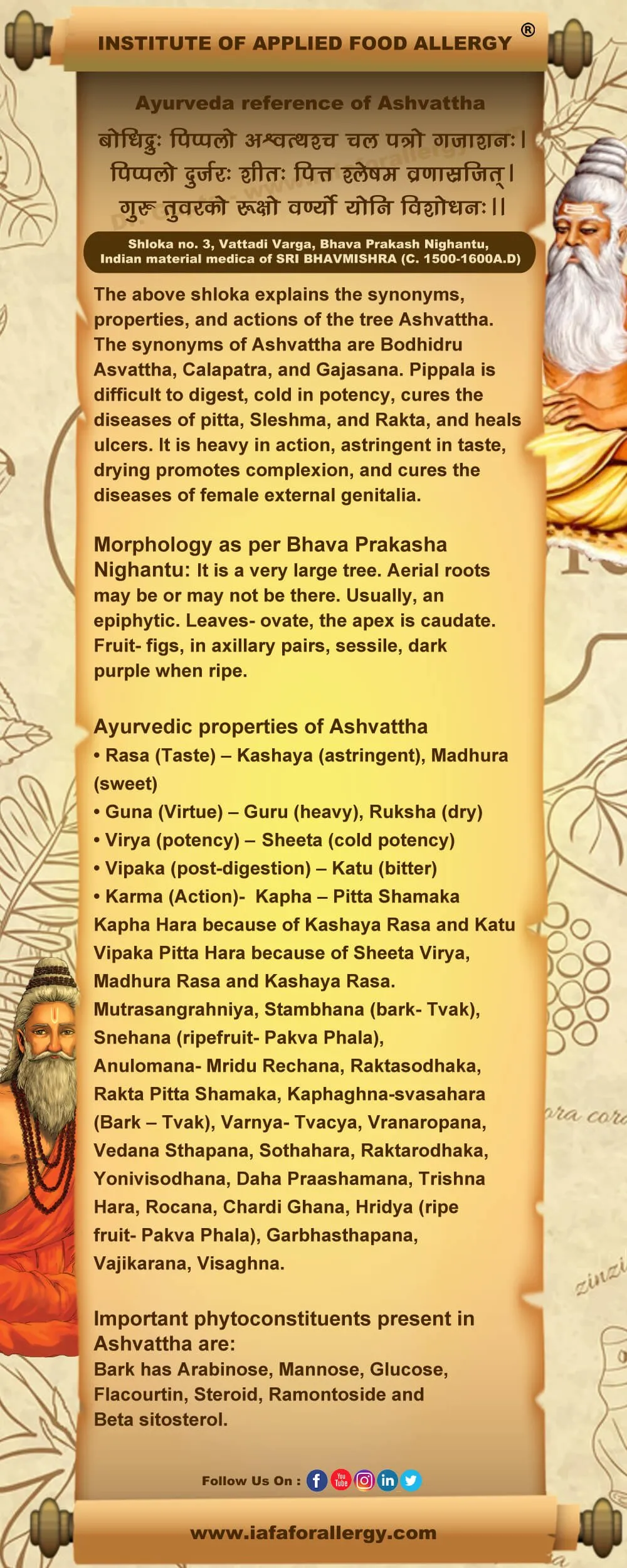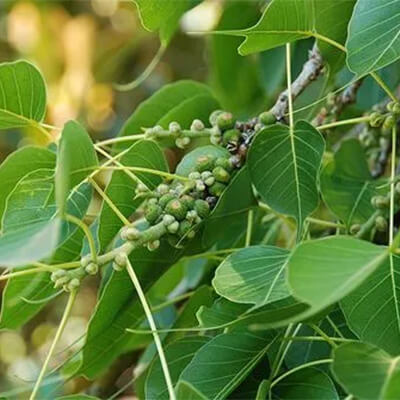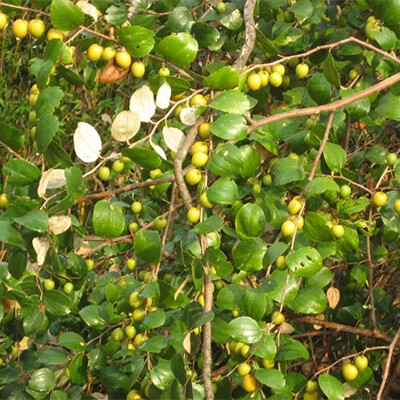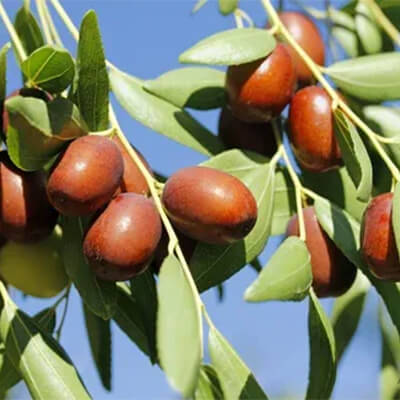On This Page
Ashvattha (Ficus Religiosa) – A Sacred Gift of Nature
Introduction
Ashvattha is botanically known as Ficus religiosa Linn. is a large perennial tree that has got religious, medicinal as well as mythological importance. Ashvattha is commonly known as the Peepal tree, which is distributed throughout the plains of India. Along with this Ashvattha is distributed globally in Nepal, Pakistan, China, Thailand, Myanmar, Iraq, Vietnam, etc. Peepal trees are largely planted as roadside tree, especially near temples. Ashvattha is known for more than 150 names around the world. Ashvattha consists of various chemical constituents like sterols, flavonoids, phenolic compounds, terpenoids, tannins, etc due to which it exhibits various pharmacological activities like antioxidant, anti-microbial, anti-inflammatory, analgesic, wound healing, proteolytic, anti-convulsant, etc. As per Ayurvedic classical texts, Ashvattha is Kashaya (astringent), Madhura (sweet), in taste, and Sheeta in Virya i.e cold potency. Acharaya Charaka “the father of medicine” regarded Ashvattha under Mutra Sangrehaniya Dravya and used it for various disorders like Yoni Roga (gynecological disorder), Gout (Vatarakata), Chardi (vomiting), etc.
Basonym of Ashvattha
अश्वादुतिथतो जात:, अश्व रूपेण अग्नि तिष्ठत्या अस्मिन व अथवा अश्व इव तिष्ठत्या अस्मत वाजीकर त्वात |
Ashvattha (Ficus religiosa) is believed to have originated from Ashva (horse), or the fire situated in the Ashvattha plant is in the form of a horse and the plant may be used as an aphrodisiac.
Synonyms of Ashvattha
- According to habitat
वन्य वृक्ष: – वने स्वतो जातो वृक्ष: |
Ashvattha plant also grows in the forest region.
- According to morphology
चल पत्र: – चलानि पत्राण्य अस्य |
Leaves of Ashvattha are found moving constantly.
पिप्पल: – सूक्षम फल: |
Fruits are very small in size.
- According to properties and action
प्लीहारि: – प्लीह वृद्धि नाशक: |
Asvattha is very useful in splenomegaly.
गजाशन: – गजैर शयते भक्ष्यत इति |
Leaves of Ashvattha are eaten by elephants.
Regional Names of Ashvattha
- Sacred fig (English)
- Pippal (Hindi)
- Ashvattha (Sanskrit)
- Arali (Kannada)
- Areyal (Malayalam)
- Pimpala (Marathi)
- Ravichettu (Telugu)
- Pipal, Pipar (H. P)
- Asud, Ashwattha, Aswat (Bengali)
- Pimpoll (Konkan)
- Pipul (Gujarati)
- Pipli (Nepali)
- Achvuvattam, Ahasu, Aryal (Tamil)
- Pipal (Urdu)
- Osio (Uri)
- Bhor, Pipal (Punjabi)
It is also known as Peepul Tree, Bodhi Tree, Pipal Tree, Buddha Tree, Pipal, Peepal, etc.
Botanical Name
Ficus religiosa Linn.
Ficus means an edible fig.
Religiosa is regarded as a sacred plant.
Family
Moraceae (Vata Kula)
Ayurveda reference for Ashvattha (Ficus religiosa Linn.)

Scientific classification of Ashvattha
| Kingdom | Plantae |
| Class | Dicotyledons |
| Subclass | Monochlamydae |
| Order | Unisexual |
| Family | Moraceae |
| Genus | Ficus |
| Species | religiosa |
Classification of Ashvattha as per Charaka and Sushruta
- Charaka: Mutra Sangrahniya Mahakshaya
- Sushruta: Nyagrodhadhi Gana
Ashvattha’s description in Brihtrayi
| Charaka | Shusruta | Vagbhata (Ashtang Hridya) |
| C. S. Su. 4/ 33 | S. S. Su. 38/ 48 | A. H. Su. 21/ 16 |
| C. S. Su. 5/ 18 | S. S. Chi. 3/ 6 | A. H. Su. 25/ 35 |
| C. S. Su. 25/ 49 | S. S. Chi. 11/ 8 | A. H. Chi. 3/ 89 |
| C. S. Su. 27/ 103, 162 | S. S. Chi. 26/ 27 | A. H. Chi. 6/ 53 |
| C. S. Vi. 8/ 151 | S. S. U. 21/ 9 | A. H. Chi. 8/ 126 |
| C. S. Chi. 3/ 257 | A. H. Chi. 9/ 101 | |
| C. S. Chi. 4/ 103 | A. H. Chi. 10/ 42 | |
| C. S. Chi. 6/ 31 | A. H. U. 18/ 2 | |
| C. S. Chi. 11/ 30 | A. H. U. 22/ 82 | |
| C. S. Chi. 14/ 225, 234 | A. H. U. 25/ 29, 59 | |
| C. S. Chi. 19/ 106 | A. H. U. 27/ 14 | |
| C. S. Chi. 21/ 85 | ||
| C. S. Chi. 25/ 45, 86, 112, 116 | ||
| C. S. Chi. 26/ 97 | ||
| C. S. Chi. 29/ 130 | ||
| C. S. Ka. 1/ 7 | ||
| C. S. Si. 6/ 65 | ||
| C. S. Si. 8/ 37 | ||
| C. S. Si. 11/ 23 |
Ashvattha’s description in Brihtrayi as Pippala
Shusruta Samhita: S. S. Ka. 8/ 110, 120
Ashtanga Hridya: A. H. Su. 15/ 41
Ashvattha’s description in Brihtrayi as Bodhi Vriksha
Charaka Samhita: C. S. Chi. 29/ 158
Ashtanga Hridya: A. H. U. 37/ 70
Ashvattha’s description in Brihtrayi as Kshiri
| Charaka | Shusruta | Vagbhata (Ashtang Hridya) |
| —— | S. S. Su. 36/ 23 | A. H. Su. 27/ 49 |
| S. S. Chi. 2/ 65, 83 | A. H. Su. 29/ 72 | |
| S. S. Chi. 19/ 43 | A. H. Sa. 2/ 2, 56 | |
| S. S. Chi. 20/ 35 | A. H. Chi. 5/ 40 | |
| S. S. Chi. 22/ 15, 17 | A. H. Chi. 6/ 70 | |
| S. S. Ka. 5/ 60 | A. H. Chi. 13/ 4 | |
| S. S. Ka. 8/ 133 | A. H. U. 1/ 6 | |
| S. S. Sa. 10/ 61 | A. H. U. 3/ 59 | |
| S. S. U. 39/ 179 | A. H. U. 22/ 13 | |
| S. S. U. 40/ 104 | ||
| S. S. U. 47/ 41 |
Ashvattha’s description in Brihtrayi as Kshira Druma
Sushruta Samhita: S. S. U. 18/ 36
Ashvattha’s description in Brihtrayi as Kshiravana, Kshirvana Druma
Charaka Samhita: C. S. Chi. 12/ 66, 67, C. S. Chi. 22/ 45
Ashvattha’s description in Brihtrayi as Kshir Vriksha
Sushruta Samhita: S. S. Su. 2/ 4, S. S. Su. 46/ 163, 165, 253, 432, S. S. Chi. 1/ 17, 113, S. S. Chi. 7/ 33, 34, 35, S. S. Chi. 20/ 15, S. S. Chi. 24/ 15, S. S. Chi. 38/ 79, S. S. Sa. 10/ 13, S. S. U. 21/ 23, S. S. U. 23/ 6, S. S. U. 29/ 4
Ashvattha’s description in Brihtrayi as Kshiri Druma
Charaka Samhita: C. S. Sa. 8/ 34, C. S. Chi. 23/ 203
Sushruta Samhita: S. S. Chi. 25/ 40
Ashtanga Hridya: A. H. Chi. 9/ 80, A. H. U. 34/ 3
Ashvattha’s description in Brihtrayi as Kshir Padap
Ashtanga Hridya: A. H. U. 3/ 46
Ashvattha’s description in Brihtrayi as Kshiri Vriksha
Charaka Samhita: C. S. Chi. 11/ 55, C. S. Chi. 23/ 198
Sushruta Samhita: S. S. U. 39/ 252
Ashtanga Hridya: A. H. Chi. 11/ 56, 59, A. H. Chi. 12/ 39, A. H. U. 22/ 42, A. H. U. 32/ 15, 32, A. H. U. 37/ 26, 69
Historical background of Ashvattha
It is a huge tree attaining 20 m in height bearing flowers in hypanthodium inflorescence. It is found all over India. It is one of the very important medicinal plants in Ayurvedic literature mentioned extensively by Samhita Granthas and Nighantus. It is important to note that Brihtrayi texts emphatically described it as Vrishya Dravya. Historically the plant is very important since Lord Buddha had revelation under this tree.
External morphology of Ficus religiosa
- Habit: A large glabrous, usually epiphytic tree.
- Leaves: Leaves of Ashvattha are coriaceous, 10-18 by 7.5-10 cm., ovate-round, narrowed upwards and the apex produced into a linear-lanceolate tail about half as long as the main portion of the blade (1/3 as long as the whole blade), entire, base broad, rounded, truncate sometimes in young leaves cordate; 5-7 nerved, lateral main nerves about 8 pairs, with finely reticulate venation between, petioles 7.5-10 cm. long, slender, stipules minute, ovate, acute.
- Flowers: Minute unisexual, monoecious on the inner walls of a fleshy receptacle. Receptacles in pairs, axillary, sessile, smooth, depressed-globose, 13 mm. in diameter. They are dark purple when ripe. Stamen 1; anther single, ovate-round, filament short. Gall and fertile flowers are sessile or pedicellate; the gall flowers are much more numerous than the fertile females, many of them without perianth. Sepals 5, lanceolate. Style short, lateral, stigma rounded.
- Fruit: Fig
Flowering and fruiting time
Summer season and rainy season maturity.
Distribution of Ashvattha
Throughout India, Sub-Himalayan forests. It is found in the plains and lower hills of India, Ceylon, and Malaya, it is commonly planted near the temples, since it is regarded as a sacred tree having religious significance.
The useful part of Ashvattha
Bark, fruits, and leaves.
Important phytoconstituent of Ashvattha
Bark has Arabinose, Mannose, Glucose, Flacourtin, Steroid, Ramontoside, and Beta-sitosterol.
Recent research on Ashvattha
- A study was done to investigate the hepato- protective effect of methanolic extract of Ficus religiosa L. Moraceae on Isoniazid Rifampicin and Paracetamol induced hepatotoxicity in rats. Administration of methanolic extracts of Ficus religiosa significantly prevented isoniazid-rifampicin and paracetamol-induced elevation in the levels of serum diagnostic liver marker enzymes and TBARS levels in experimental groups of rats. Moreover, total protein and reduced glutathione levels were significantly increased in the treatment group. The effect was compared with a standard drug Liv 52. Parameswara SA, Chetty CM, Chandrasekhar KB. Hepatoprotective activity of Ficus religiosa leaves against isoniazid + rifampicin and paracetamol-induced hepatotoxicity. Pharmacognosy Res. 2013. Oct; 5 (4); 271-6.
- B- sitosterol-D-glucoside, showed hypoglycemic activity which compared favorably with that of tolbutamide (Ambika & Rao, 1967).
- The aqueous solution of the alcoholic extract of the bark decreased the tone and diminished the amplitude of movements of isolated intestines of rabbit, guinea pig, and albino rats and intestine in situ of dog. It also depressed the contraction of the isolated uterus of rats.
- The extract showed anti-acetylcholine but not antihistamine action on isolated guinea pig hearts (Malhotra et al., 1960a).
- The hot alcoholic extract of the bark relaxed the intestines of albino: rat, guinea pig, rabbit, and dog, and the uterus of rat. It antagonized different spasmogens. The extract blocked the cardiovascular effect of acetylcholine and was also vagolytic. It did not affect the cardiovascular effects of histamine. It protected guinea pig against acetylcholine and histamine-induced asthma. Oral LD goes in albino rats was 2.24g/kg while i.v. LDgo was 0.80 gl kg (Malhotra et al., 1960b).
Rasa Panchaka of Ashvattha
| Rasa (Taste) | Kashaya (astringent), Madhura (sweet) |
| Guna (Virtue) | Guru (heavy), Ruksha (dry) |
| Virya (potency) | Sheeta (cold potency) |
| Vipaka (post-digestion) | Katu (pungent) |
Dosha Karma of Ashvattha
Kapha – Pitta Shamaka
Kapha Hara because of Kashaya Rasa and Katu Vipaka
Pitta Hara because of Sheeta Virya, Madhura Rasa, and Kashaya Rasa.
Karma (Actions) of Ashvattha
Mutrasangrahniya, Stambhana (bark- Tvak), Snehana (ripefruit- Pakva Phala), Anulomana- Mridu Rechana, Raktasodhaka, Rakta Pitta Shamaka, Kaphaghna-svasahara (Bark – Tvak), Varnya- Tvacya, Vrana Ropana, Vedana Sthapana, Sothahara, Raktarodhaka, Yonivisodhana, Daha Prashamana, Trishna Hara, Rocana, Chardi Ghana, Hridya (ripe fruit- Pakva Phala), Garbha Sthapana, Vajikarana, Visaghna.
Prayogarha Vyadhi (Therapeutic indication) of Ashvattha
- Abhyantara (Internal uses): Chardi, Trishna Atisara, Pravahika, Udarasula-Vibandha, Raktavikara, Vatarakta, Raktapitta, Kasa, Shvasa, Kukkurakasa, Yonidosa, Klaibya, Prameha, Varnavikara.
- Bahya (External use): Varnavikara, Vedana, Shotha, Raktasraval, Vrana, Vranasotha, Bhagandara, Mukhapak.
Aamyik Paryog (Therapeutic uses) of Ashvattha
Rajayakshma (Consumption): Asvatthamuladi Modaka is prescribed in consumption. (Bhel Samhita Chikitsa Sthana. 4. 54- 70)
Chardi (Vomiting): The dried bark of Asvattha is burnt and dipped in water. This water, by intake, checks to vomit. (Bhava Prakasha Chikitsa Adhikara. 17/ 23)
Shool (Colic): Decoction of the root bark of as Ashvattha added with salt and jaggery, by intake, alleviates severe colic. (Siddha Bhaishjya Manni Mala. 4/ 506)
Vatarakta (Gout): Decoction of (the bark of) Asvattha should be taken in the case of Vatarakta. (Charaka Samhita Chikitsa Sthana. 29/ 158)
Vrishya (As aphrodisiac): One taking milk cooked with fruit, root, bark, and leaf-bud of Asvattha and added with sugar and honey is stimulated sexually. (Sushruta Samhita Chikitsa Sthana. 26/ 27)
Dagadh (Burns): Dusting with powder of the dried bark of Asvattha promotes healing in burns. (Vrinda Madhava. 45/ 21)
Karn Shool (Earache):
- Leaves of Asvattha are kept on the ear and heated. The oil so extracted and dropped in the ear removes pain. (Sushruta Samhita Uttara Tantra. 21/ 9- 10, also Vrinda Madhava. 59/ 8- 9)
- The ear should be fomented, and then warm juice extracted from the leaves of Asvattha, Bilva, Arka, and Eranda separately smeared with oil and rock salt by closed heating should be dropped into the ear. It also alleviates earaches. (Ashtanga Hridya UttaraTantra. 18/ 2- 3)
Mukhapaka (Stomatitis): In children, if there is inflammation in the mouth the paste of bark and leaves should be applied. (Chakra Dutta. 64/ 49)
Visha (Poisoning): An insect bite, cold paste of Asvattha, Slesmataka, and Bibhitaka should be applied to the affected part. (Ashtanga Hridya UttaraTantra. 37/ 70)
Vrana (Wounds): Leaves of Asvattha are used for covering the wound. (Charaka Samhita Chikitsa Sthana. 25/ 95,113)
Bhagna (Fracture): The bark of Asvattha is used as a splint in fractures. (Sushruta Samhita Chikitsa Sthana. 3/ 6)
Vidaaha (Inflammation): The paste of Nyagrodha, Udumbara, Asvattha, Palasa, and vetasa added with plenty of ghee is applied to the inflamed part. It alleviates the disorder. (Ashtanga Hridya Uttara Tantra. 25/ 29)
Prameha (Diabetes):
- In Nilameha, the decoction of Salasaradi Gana or Vattha should be administered. (Sushuruta Samhita Chikitsa Sthana. 11/ 9)
- Seeds of Asvattha, mixed with stag-horn and honey taken with buttermilk. It alleviates Prameha. (Vaidya Manorama.7/ 16)
Benefits of Ashvattha
- It is useful as an alternative, aphrodisiac, astringent, cooling, expectorant, laxative, and contraceptive. It is used in asthma, colic, constipation, conception (promoting the maturity of the fetus in pregnant mothers), diarrhea, dysentery, disorders of Genito-urinary troubles, and whooping cough.
- It is a well-known rejuvenator and the leaf bud is made into jam and taken with milk for a fortnight.
- Its employment in Pancha Valkala, a group of five bark-producing trees, in Indian medicine has medicinal utility. As the preparation is much used as a gargle in salivation, as a washing lotion for ulcers, and as an astringent injection or enema in leucorrhea and uterine affection (including genital tract in females).
- A recipe mostly made of ripe-fruit powder is reported to be useful in conception and delivery of the male child in the son-desiring mothers and also helping remove sterility to make females festive as the plant is used as a promoter of conception.
- The bark is astringent. The decoction or infusion is given for gonorrhea and scabies. A paste of the bark is applied or inflammatory swellings as an absorbent. Its juice is used to relieve toothache and strengthen the gums.
- It is a useful dressing for cracked and inflamed soles of the feet. The powder prepared from root bark promotes granulation when dusted over sores and its paste is applied to aphthous sores of children.
- The figs of the plant are useful as digestive, and laxative and they are powdered and given for asthma and allied ailments.
- It is used in diabetes, diarrhea affections, hysteria, menstrual troubles-menorrhagia, nervous disorders, sterility, and vaginal complaints.
- It is used in blood diseases, earache, fracture, diabetes, glandular diseases especially suppurating glands in the neck, hemophilia conditions, scabies, soreness in the mouth, swelling ulcers, urogenital disorders, vaginal discharges, and vomiting.
- Beta-sitosterol-D-glucoside has been found in the bark which has shown hypoglycemic activity compared favorably with tolbutamide. It is recommended for diabetes. The fruit is sour and the seeds are useful in biliousness, scabies, bronchitis, itch, boils, and inflammation.
- All parts are acrid, pungent, cooling, and useful in diseases of the blood and the vagina, ulcers, burning sensation, biliousness, Kapha, inflammation, leprosy, hallucinations, and loss of consciousness; it promotes and maintains pigmentation and color of the skin and allays its allied disorders.
- The shoots are topically applied over ailments caused by discoloration and anomalies of pigmentation. Powder of the bark is used over ulcers. The milky juice is applied externally to hemorrhage as a styptic remedy, and it is also applied to painful and inflamed organs.
- The bark is applied to stomatitis, fistula- in- ano, and boils.
- The bark is given in vomiting, as the decoction is filtered, and water is useful to check over thirst and omitting ailments.
- The various parts of the plant are useful as an aphrodisiac and given as a sexual tonic. The fruits, roots, bark, and shoots are boiled in milk (Siddha Ksira) and it is orally given mixed with sugars and honey.
- Bark and fruits are used in anomalies of urine.
- The leaf juice is mixed in oil and boiled, and it is used in earache.
- The bark powder mixed with honey is used in stomatitis of infants.
- The bark decoction is useful in gout.
Matra (Therapeutic administration and dosage) of Ashvattha
- Churna (powder): 1- 3gram
- Kwatha (decoction)- 50- 100 ml
- Swarasa (juice): 12- 24 ml

Have A Health Issue?
Consult Online
- Dr. Sahil Gupta (B.A.M.S., M.H.A.)
Ayurvedic Allergy Specialist
CEO & Founder of IAFA®
Classical reference of Ashvattha
Bhava Prakasha Nighantu Vattadi Varga- 3
Synonyms
बोधिद्रु: पिप्पलो अश्वत्थ श्च चल पत्रो गजाशन: |
Bhava Prakasha Nighantu Vattadi Varga- 3
Properties and action
पिप्पलो दुर्जर: शीत: पित्त श्लेषम व्रणास्रजित् |
गुरु तुवरको रूक्षो वर्ण्यो योनि विशोधन: ||
Dhanwantri Nighantu Aamradi Varga, 76
अश्वत्थो अपि समृतस्तदवद् रक्त पित्त कफापह: |
Kaiydeva Nighantu Aushadi Varga, 432, 433
अश्वत्थ: शीतलो रूक्ष: कषायो दुर्जरो गुरु: |
व्रण पित्त कफास्रघ्नो वर्ण्यो योनिविशोधन: ||
Raja Nighantu Aamradi Varga, 114, 115
पिप्पल गुण
पिप्पल: सुमधुरस्तु कषाय: शीतलश्च कफ पित्तविनाशी |
रक्त दाहशमनः: स हि सद्यो योनिदोषहरण: किल पक्व: |
अश्वत्थ वृक्षस्य फलानि पकवान्यतीवहद्यानि च शीतलानि |
कुर्वान्ति पित्तास्विषार्तिदाहं विच्छ्दि शोषारुचि दोषनाशम् ||
Priya Nighantu Haritkyadi Varga, 106
लोके: शोकहरः खलु प्रतिदिनं संस्तूयते श्रद्धा |
शीतो असौ तुवरो रसे हिततमः क्षीरि् द्रुमण्णाम वर: |
वातास्त्रे द्रवशोषणे वृषविधौ शस्त श्च चिकित्साविदाम् ||
Kaiydeva Nighantu Aushadi Varga, 431, 432
अश्वत्थ: पिप्पलो बोधि सत्वो गजाशन: |
शुचि श्च चैत्य श्च चल दल: श्यामल: स्वादु बीजक: ||
मंगल्य: केश वायसो लक्ष्मीवान क्षीर पादप: |
Raja Nighantu Aamradi Varga, 112, 113
अश्वत्थश्वाच्युतावास श्च चल पत्र: पवित्रक: |
शुभदो बोधिवृक्षश्च याज्ञिको गजभक्षक: ||
श्रीमान् क्षीरद्रुमो विप्रो मंगल्य: श्यामलश्च सः |
पिप्पाली गुह्मपुष्पश्च सेव्य: सत्य: शुचि द्रुम ||
चैत्य द्रुमो धर्मवृक्षो ज्ञेयो विंशति: संज्ञक: ||
Raja Nighantu Aamradi Varga, 121
अश्वत्थिका
अश्वत्थी लघुपत्री स्यात्पवित्रा हस्वपत्रिका |
पिप्पलिका वनस्था च क्षुद्रा च अश्वत्थ सन्निभा ||
Raja Nighantu Aamradi Varga, 122
अश्वत्थिकागुणा:
अश्वत्थिका तु मधुरा कषाया चास्रपित्तजित् |
विष दाह प्रशमनी गुर्विण्या हितकारिणी ||
Charaka Samhita, Chikitsa Sthana, 29/ 158
त्रिदोष वात रक्ते
बोधिवृक्षकषाय तु प्रपिवेन्मधुना सह ||
वात रक्तं जयत्याशु त्रिदोषमपि दारुणम: ||
Bhava Prakasha Chardi Adhikara, 17/ 23
दु्जेयवमनप्रतिषेधर्थं
अश्वत्थवल्कल शुष्क दग्धं निर्वापितम जले |
तज्जलं पानमात्रेण छर्दिं जयति दुर्जयाम् ||
Bhava Prakasha Baal Roga Adhikara, 71/ 174
बालमुखपाकहरप्रलेपम्
अश्वत्थत्वग्दलक्षैद्र्मुखपाके प्रलेपनम् |
Chakradutta, 1/ 233
दैव व्यपाश्रय चिकित्सान्तर्गतम् अश्वत्थ पत्रं ज्वरहरतर्पणम्
गंगाया उत्तरे: कूले अपुत्रस्तापसो मृतः |
तस्मै तिलोदकं दद्यात्मुझ्त्यैकाहिको ज्वर: |
एतन्मन्त्रेण. चाश्चत्थ पत्रहस्त: प्रतर्पयेत् ||
Chakradutta, Chardi Chikitsa, 15/ 24
वमने अश्वत्थ क्षार जलम्
अश्वत्थ वल्कलं शुष्क दग्ध्वा निर्वापित जले |
तत्तोयपान मात्रेण छर्दिं जयति दुस्तराम् ||
Chakradutta, Karna Roga Chikitsa, 57/ 7, 8
कर्ण शूले अश्वत्थ पत्र स्वरसप्रयोग:
अश्वत्थ पत्र खल्वं वा विधाय बहु पत्रकम |
तैलाकम अंगारपूर्ण विदध्याज्छवणोपरि ||
यत् तैल च्यवते तस्मात् खल्वाद अंगारतापितात्।
तद् प्राप्त श्रवण स्त्रोत सद्यो गृह्वाति वेदनाम् ||
Srimad Bhagvat Geeta, Adhayaya, 10/ 26
अश्वत्थदिव्यत्वम्
अश्वत्थ: सर्ववृक्षाणां देवर्षीणां च नारद: |
गन्धर्वाणां: सिद्धानां सिद्धानां कपिलो मुनि: ||
Charaka Samhita Sutra Sthana, 4/ 33, etc., Charaka Samhita Vimana Sthana. 8/ 151, Charaka Samhita Chikitsa Sthana, 3/ 257, etc, Charaka Samhita Kalpa Sthana,1/ 7, etc.
Sushruta Samhita Sutra Sthana, 38/ 43, Sushruta Samhita Chikitsa Sthana, 3/ 6, 11/ 8, 26, 27, Sushruta Samhita Uttara Tantra. 21/ 9
Ashtanga Hridya Sutra Sthana, 21/ 26, etc, Ashtanga Hridya Chikitsa Sthana, 3/ 89, Ashtanga Hridya Uttara Tantra, 18/ 2, etc.
संहितायामश्वत्थ:
पिप्पल बोधि वृक्ष
(पिप्पल-बोधिवृक्ष)
Chakra Dutta, 64/ 49
मुखपाके
अश्वत्थत्वगदल क्षौद्रै: मुखपाके प्रलेपनम् |
Ashtanga Hridya Uttara Tantra, 37/ 70
कीटविषे
सेका लेपास्तत: शीता बोधि श्लेष्मताकाक्षकै: |
Charka Samhita Chikitsa Sthana, 25/ 15, 113
व्रणे
…पिप्पलस्य च। व्रणप्रच्छादने…..चादिशेत् ||
Sushruta Samhita Chikitsa Sthana. 3/ 6
भग्ने
कुशार्थम् |
Ashtanga Hridya Uttara Tantra. 25/ 29
व्रणशोफे
न्यग्रोधोदुम्बराश्वत्थ प्लक्ष वेतस वल्कलै: |
प्रदेहो भूरि सर्पिर्भि: शोफ निवापण: परम् ||
Sushruta Samhita Chikitsa sthana. 11/ 9
नीलमेहे
नीलमेहिनं शालसारादि कषाय अश्वत्थ कषायं वा पाययेत्।
Vaidya Manorma. 7/ 16
प्रमेहे
अश्वत्थबीजं हरिणस्य श्रृंग तक्रेण पीत मधुना सहैव |
प्रमेहजात सकलं निहन्ति दशाननं दाशरथिर्यथेव ||
Specific Formulation of Ashvattha
- Ashvattha Kashayam for Vata Rakta
- Ashvattha Ksarajala for Chardi
- Pancha Valkala Lepa for Vrana Shotha
Contraindication and side effects of Ashvattha
Ashvattha Tvak Churna (bark powder) is recommended in Pregnancy in the prescribed dosage. However, it is important to consult your doctor before taking Ashvattha. People with Vivandha (Constipation) should take care while using Ashvattha. As such no known side effect or adverse effect related to Ashvattha has been reported.
Suggestive reading regarding Ficus religiosa
- Chandrasekar, S. B., Bhanumathy, M., Pawar, A. T., & Somasundaram, T. (2010). Phytopharmacology of Ficus religiosa. Pharmacognosy Reviews, 4 (8), 195– 199. https://doi.org/ 10. 4103/ 0973- 7847. 70918.
- Sandeep, & Kumar, Ashwani & Sepla, Dimple & Tomer, Vidisha & Gat, Yogesh & Kumar, Vikas. (2018). Ficus religiosa: A wholesome medicinal tree.
- Verma I, Gupta RK. Estimation of phytochemicals, nutritional, antioxidant, and antibacterial activity of dried fruit of sacred figs (Ficus religiosa) and formulation of the value-added product (Hard Candy). J Pharmacognosy Phytochem. 2015; 4 (3): 257- 267.
- Al-Snafi, Ali. (2017). Pharmacology of Ficus religiosa-A review. IOSR Journal of Pharmacy. 7. 61-71. 10. 9790/ 3013- 0703014960.
- Singh, Pratistha & Ranjan, Renuka & Tripathi, Ruchita & Dixit, Jyoti & Sinha, Neeraj & Singh, Anil Kumar & Tiwari, Kavindra. (2021). GC-MS and NMR spectroscopy-based metabolite profiling of Panchvalkal Kwath (a polyherbal formulation). Natural Product Research. 1- 6. 10. 1080/ 14786419. 2021. 1990919.
- Kapila C, Kulkarni A, Pardeshi P, Sayed A, Nehe A, Ficus religiosa: A beneficial medicinal plant, Journal of Drug Delivery and Therapeutics. 2022; 12 (2-s): 210- 218
- Kapila C, Kulkarni A, Pardeshi P, Sayed A, Nehe A. Ficus religiosa: A beneficial medicinal plant. JDDT
- Ashish Kumar Gupta, Shalini Gupta, & Charu Bansal. (2021). A Critical Review on Ashvattha Leaves (Ficus Religiosa Linn.): An Ayurvedic Perspective and Current Practice. International Journal of Ayurveda and Pharma Research, 9 (6), 62- 68. https://doi.org/ 10. 47070/ ijapr. v9i6.1664
- Wangkheirakpam SD, Laitonjam WS. Comparative study of leaves of Ficus pomifera wall, Ficus hispida Linn. And Ficus religiosa Linn. for the biochemical contents, minerals, and trace elements. Indian J Nat Prod Resour. 2012; 3 (2): 184- 188.
- Yadav YC, Srivastava DN. Nephroprotective and curative effects of Ficus religiosa latex extracts against cisplatin-induced acute renal failure. Pharm Bio. 2013; 51 (11): 1480- 1485.
- Yadav YC. Hepatoprotective effect of Ficus religiosa latex on cisplatin-induced liver injury in Wistar rats. Braz J Pharmacog. 2015; 117: 1- 6.
- Gautam, Sanskriti & Meshram, Anju & Bhagyawant, Sameer & Srivastava, Nidhi. (2014). FICUS RELIGIOSA-POTENTIAL ROLE IN PHARMACEUTICALS. International Journal of Pharmaceutical Sciences and Research. 5. 1616. 10. 13040/ IJPSR. 0975- 8232. 5(5). 1616- 23.
- Koirala, Barsha & Pakuwal, Evance & Rai, Hookman & Shrestha, Angela. (2022). EVALUATION OF ANTIOXIDANTS AND ANTIMICROBIAL PROPERTIES OF INDIGENOUS PLANTS: Elaeocarpus sphaericus AND Ficus religiosa. International Journal of Environment. 10. 54- 61.
- Rao, Yarrapragada & Dhanalakshmi, C. & Vairavel, Dinesh & Surakasi, Raviteja & Seeniappan, Kaliappan & Patil, Pravin & Socrates, S. & JoshuaRamesh Lalvani, Isaac. (2022). Investigation on Forestry Wood Wastes: Pyrolysis and Thermal Characteristics of Ficus religiosa for Energy Recovery System. Advances in Materials Science and Engineering. 2022. 1-9. 10. 1155/ 2022/ 3314606.
- Jaafar, Noor & Hamad, Maha & Alshammaa, Duha & Noori, Zainab. (2021). Phytochemical study and thin layer chromatography of Ficus religiosa leaves extract cultivated in Iraq. Al Mustansiriyah Journal of Pharmaceutical Sciences. 21. 31-39. 10.32947/amps. v21i2.807.
References
- Agnivesha, Charaka, Dridhabala. In: Charaka Samhita, ed. Vaidya Jadavaji Trikamji Aacharya., editor. Varanasi: Chaukhamba Sanskrit Sansthan; 2009.
- Sushruta. In: Sushruta Samhita, Sutra Sthana, ed. Vaidya Jadavji Trikamji Acharya., editor. Varanasi: Choukhambha Orientalia; 2005.
- Vagbhata. In: Ashtanga Hrudaya, 9th ed. Anna Moreshwar Kunte, Krishnashastri Navarre, Harishastri, editors. Varanasi: Choukhambha Orientalia; 2005.
- Bhavamishra. In: Bhava Prakasha Nighantu, Vattadi Varga 11th ed. part 2. Brahma Shankara Mishra., editor. Varanasi: Choukhambha Bharati Academy; 2009.
- Bhavprakasha, commentary by Bulusu Sitaram, forwarded by K.C.Chunekar
- Sharma PV, Kaideva Nighantu. Aushadhi Varga. Chaukhamba Orientalia, Varanasi; 2006:
- Tripathi I., Raja Nighantu, Aamradi Varga, Chaukhamba Krishnadas Academy; Varanasi; 2010
- Dhanwantri Nighantu, Aamradi Varga
- P.V. Sharma, Priya Nighantu, Haritkyadi Varga, Chaukhamba Krishnadas Academy; Varanasi.
- Dr. Gyanendra Pandey, Dravyaguna Vigyana, reprint 2012, Chawkhamba Krishnadas Academy
- K. Niteshwar Dravyaguna Vigyan, reprint 2017.
- Dr. J.L.N. Sastry and Dr. B.S. Sastry, Dravyaguna Vigyana, Chaukhambha Orientalia, Varanasi.
- Chakrapanidatta, Chakradatta with the vaidya Prabha hindi commentary by indra deva tripathi, chaukambha sankrita sansthan, varanasi 2nd Edition, 1994.
Ayurveda is an Indian system of medicine that is popular since ancient times. Dr. Gupta’s IAFA® has been conducting research studies to find out different phytoconstituents of herbs and their action in the body. Such knowledge acquired by our experts is used in the preparation of medicines and providing the treatment facilities safely and effectively. IAFA® is the provider of safe and effective treatment for a wide range of diseases, mainly allergic diseases all based on Ayurveda.
Was this Page Helpful?
Read More Articles

Souvira / Raja Badara (Zizyphus Sativa, Ziziphus Xylopyrus, Zizyphus Vulgaris) – Part – 2
Souvira or Raja Badara botanically known as Zizyphus vulgaris or Zizyphus xylopyra is a deciduous tree…

Karkandhu / Kshudra Badara (Zizyphus Nummularia) – Part – 3
Karkandhu or Z. nummularia is a type of Badara that is commonly…

Badara / Kola (Ziziphus Jujuba, Ziziphus Mauritiana) – Part – 1
Badara is wildly and cultivated found in India and it is a…












